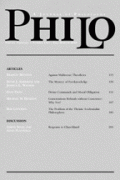Layman’s Lapse: On an Incomplete Moral Argument for Theism

Layman’s Lapse: On an Incomplete Moral Argument for Theism
By Dr. Paul Franks and Dr. Richard Davis
C. Stephen Layman contends that an argument supporting theism over naturalism can be constructed based on three defensible, non–question-begging premises about the moral order. Previous critics of Layman’s argument have challenged the truth of these premises. We stipulate them arguendo but go on to show that there is a deeper problem: a fourth premise introduced to complete the argument—the “completion premise,” as we call it—is true only if we assume that God exists (begging the question about naturalism) or we concede that there is no afterlife (contrary to theism). We close with suggestions for how Layman’s argument must be strengthened to meet with dialectical success.
Read or Buy OnlinePeer Reviewed Article
Pages: 1-10
Volume #: 16
Article in: Philo: A Journal of Philosophy
Published in: 2013
Publisher: Philosophy Documentation Centre